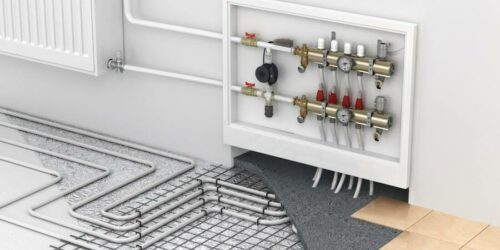Solar Panel Efficiency
- Solar panels work even on a cloudy day
- Long life span increasing your solar panel efficiency
- Some panels can convert up to 23% of the sun's energy into electricity
- Commercial panels can harness even more of the sun’s energy
As with many elements of solar energy, your solar panel efficiency will depend on several factors, many of which will boil down to the quality and the price you are willing to pay for it. The main elements of solar panel systems are of course the solar panels themselves, and the inverter which converts direct current (DC) energy into alternating current (AC) energy. This allows it to power the appliances within your home, like your fridge, oven, and TV.
Solar panels are created from a range of materials, some being better than others. In order of the most efficient, some of the most common types of solar panels include monocrystalline solar panels, polycrystalline solar panels, and thin-film solar panels. Many solar panels now come with energy efficiency ratings, which is something that was not always the case originally. They may also include their depreciation value – how much efficiency they lose over time.
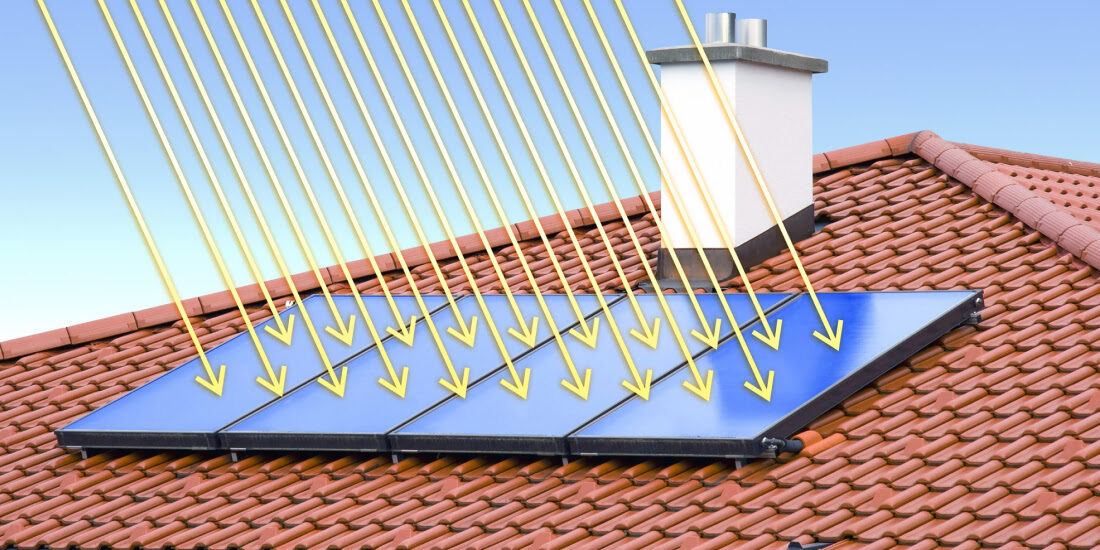
What's On This Page?
Click the links below and head straight to a specific section of the article.
Solar Panel Efficiency and What it Means
The efficiency of a solar panel is measured by what percentage of the sun it can convert into useable energy. Say you have a solar panel efficiency of 20%, which is the average for a decent quality solar panel. This means that the panel can convert 20% of all the sunlight it harnesses into energy that can be used within the home. Similarly, panels with lower solar panel efficiency will be able to harness and convert a lower percentage of energy.
However, as we mentioned earlier, it is not simply the panel alone that will determine the solar panel efficiency. There are several factors that contribute to the end conversion rate of energy from the panels, some of which we will look at in more detail below. These are not all the factors, but some of the main contributors that determine how efficient your system is.
- Positioning and Angle of Your Solar Panels
Both angle and position of your panels will contribute to your solar panel efficiency. South facing rooftops are most beneficial, with panels at a 30-degree angle. The opposite is true for North facing rooftops, which are not recommended for getting the best solar panel efficiency.
- Shade
If you have lots of trees surrounding your property, they could lower your solar panel efficiency. If possible, you will need to ensure that trees are cut back to prevent them from blocking the sun's rays reaching your solar panels. Surrounding buildings will also need to be taken into consideration, as these can also reduce your solar panel efficiency.
- Temperature
This one may surprise you, but elevated temperatures can reduce the efficiency of your solar panels. The hotter your panels get, the further reduction in output will be. Therefore, solar panels are mounted slightly above the roof tiles, to allow for air to circulate underneath. There are various models of solar panels that are designed for warmer climates.
- Solar Panel Material
Above, we mentioned some common materials used for creating solar panels – monocrystalline, polycrystalline and thin-film. Each type of material will affect your solar panel efficiency. We will talk more about these in further detail, further into this guide.
Which Brands Offer the Highest Solar Power Efficiency?
The highest ever efficiency achieved was 47% by a group of scientists. However, this is not achievable for residential solar panel systems, and we have no time scale for when this will be achievable. Right now, the highest solar panel efficiency is 23%. Below is a list of the highest rated efficiency by brand. We have also listed their efficiency on average.
You will notice that whilst some manufacturers offer a higher maximum efficiency rating, their average ratings will differ with some being higher than others, regardless of their maximum efficiency rating. A trained expert will be able to offer you the best advice on maximising your solar panel efficiency. It should not take much effort from you at all, as solar panels are easy to maintain.
Monocrystalline vs Polycrystalline vs Thin-film Solar Panels
The type of material that your solar panels are made of will affect the solar panel efficiency, as you would expect. Monocrystalline and polycrystalline are quite similar materials, whereas thin film is quite different to both. Your household requirements and of course budget will determine the best type of solar panels for your home.
When you arrange a consultation, your installer will be able to tell you more about the distinct options that will best suit your needs. You should never compromise on the level of quality if your budget will allow. This will maximise your solar panel efficiency. Let us discuss each of the materials available below.
- Monocrystalline Solar Panels
Monocrystalline solar panels are created from a high-quality lone source of silicone. The single block of silicone is completely free of imperfections and offers the highest solar panel efficiency available. There simply is no better than this. Of course, monocrystalline is the most expensive option when it comes to solar panels, but you are guaranteed to get your money's worth when it comes to efficiency.
- Polycrystalline Solar Panels
Our next contender is polycrystalline solar panels. These are like monocrystalline solar panels, but they do have imperfections due to them being created from a mixture of silicones. Instead of a single block panel, these will have small gaps where the mixture has been put together. This lowers the solar panel efficiency, but it also lowers the price tag, making them a more affordable option for many.
- Thin-film Solar Panels
The least solar panel efficiency is offered with thin-film and therefore they are the cheapest of solar panels. These are created by a single layer of thin film, which is noticeably light and very flexible. The efficiency of thin-film solar panels is unlikely to go beyond 15%, so these would not be best suited for households with higher energy consumption.
How Much Solar Panel Efficiency is Lost Each Year?
Nothing lasts forever (except the Nokia 3210), and products lose their efficiency over time. Imagine your mobile phone battery, which starts to lose more of its charge efficiency over time. Solar panels are no different. Solar panels will last for around 25 years, and most manufacturers will offer a warranty for this length of time. It is something that is important to check before you buy.
Most solar panels will lose approximately 0.05 percent of their efficiency every year, meaning a total of 12-15% of their total solar panel efficiency is lost by the end of their life span. Most of the panel's depreciation will be a result of powerful UV rays, poor maintenance, incorrect installation, and extreme weather conditions
Some of these will be out of your control, but you can prolong depreciation by ensuring that you maintain your panels and ensure that they are installed correctly by a qualified installer. All these steps will help you to minimise the loss of solar panel efficiency and maximise your solar panel’s life span. Thankfully, maintenance is as simple as a quick clean with mild soapy water, as and when needed.
Solar Panel Efficiency in the Future
The future of solar panel efficiency can only get better in the future. We have already seen a huge improvement in efficiency alongside a tremendous reduction in the price of solar panels over several decades. Solar panels are now 99% less expensive than they were in the 70’s and the technology used has improved considerably. In recent years we've also seen the rise in solar slates which help imbed the power of solar more naturally into oyur home.
As technology is developed even further, we will see solar panel efficiency increase, as we have already seen. This is great news for homeowners and businesses alike, as we work our way towards a greener future. Having said that, now is an exciting time to get involved. Why wait to make a difference? You could be saving money now!
Finding the Right Advice and Installers
If you are newer to solar panels, it may be a bit daunting when it comes to finding the right advice and qualified installers, but it does not have to be. We can simplify the process for you. Whether you just have a few questions about solar panels or solar panel efficiency, or if you are ready to get going with your installation, we can point you in the right direction.
As well as looking through our informative guides and articles, you can contact us directly for a quote comparison. We pride ourselves in being connected with some of the best in the industry, only offering the best quality services. What are you waiting for? Get in touch now.
Related articles
View all Solar Panel articles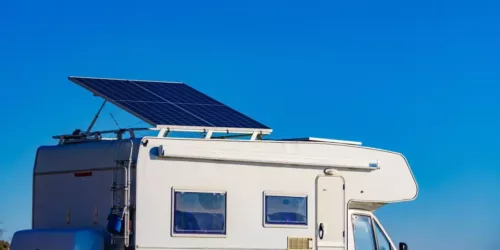
A Complete Guide to Caravan Solar Panels
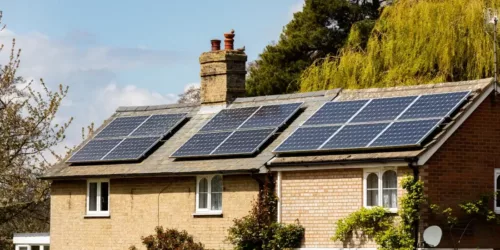
Are Solar Panels Worth It in Wales?

Project Solar UK: Company Overview
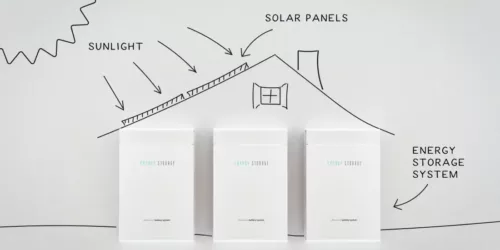
Battery Storage for Solar Panels Explained
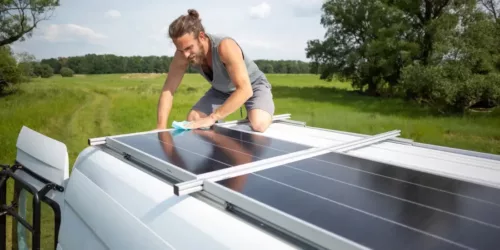
Solar Panel Kits Explained - Everything You Need to Know
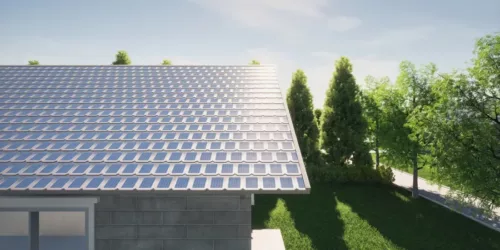
Are Solar Roofing Tiles Worth It?
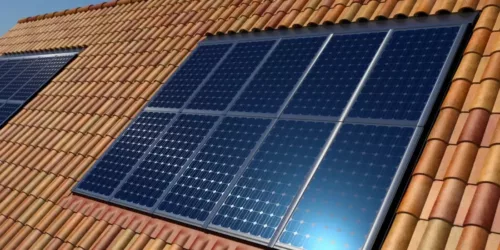
A Complete Guide to Roof Integrated Solar Panels
